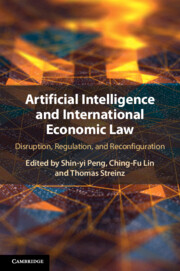The chapters assembled in this volume were written on machines distributed across four continents by humans who have devoted a significant part of their professional lives to studying and practicing international economic law.
Most authors met in person in Taipei in the fall of 2019 for the Society of International Economic Law’s (SIEL’s) Asian International Economic Law Network (AIELN) sixth biennial conference, International Trade Regime for the Data-Driven Economy: How Will Artificial Intelligence Transform International Economic Law?, organized by the Institute of Law for Science and Technology at National Tsing Hua University (NTHU). The editors and contributors are grateful to the chairs, discussants, and participants on various panels for their inputs, which fueled the momentum for our collective endeavor. The programmatic theme of the conference animated our discussions then and laid the groundwork for the framing of this book. Our insights were further developed and refined through scholarly debates and discussions and are now the joint product of twenty-one authors.
We thank the many humans who made this event, and by extension this volume, possible. We would like to express our gratitude to the anonymous reviewers of the book proposal for all their critical comments on the book as a whole, as well as on individual chapters. We thank Sally Evans-Darby for her careful editing of the final manuscript. We would also like to acknowledge a number of promising graduate students at NTHU – thanks go to Sharu Luo for his excellent editorial work as well as I-Ching Chen, Yen-Chieh Lin, and Tzu-Yin Hsu for their coordinative assistance.
This collaborative project received generous financial and technical support from SIEL and AIELN, Taiwan’s Ministry of Science and Technology, the Research Center for Humanities and Social Sciences at NTHU, and the Jean Monnet Network – Trade & Investment in Services Associates (TIISA), co-funded by the Erasmus+ Programme of the European Union. We are particularly thankful to TIISA Director Jane Drake-Brockman and other steering committee members who have been generous in sharing their expertise, and for the funding from the Erasmus+ Programme of the European Union that makes this book freely available online under a Creative Commons Open Access license. Last but not least, we are indebted to Matt Gallaway, Cameron Daddis, and the rest of the team at Cambridge University Press for their invaluable guidance and support throughout the publication process.
This book was finalized while countries around the world were still confronting a global public health crisis caused by the COVID-19 pandemic. Many came to rely on digital services as an infrastructure for social interaction and professional endeavors, including academic and educational work. The pandemic seems to have precipitated a further shift toward digital technologies and artificial intelligence. It is our hope that this book will contribute to an informed discussion about the relevance of and implications for international economic law beyond the pandemic.

